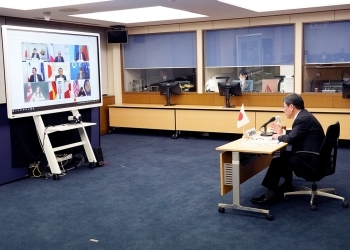Press Releases
Foreign Minister Motegi’s Attendance at the G7 Trade Ministers’ Second Meeting
May 28, 2021


On May 27, commencing at 8 p.m. JST for approximately 2.5 hours, and on May 28, commencing at 8 p.m. JST for approximately 2 hours, the G7 Trade Ministers’ second meeting was held in a virtual format, hosted by the Rt Hon Elizabeth Truss, Secretary of State for International Trade of the United Kingdom. Mr. MOTEGI Toshimitsu, Minister for Foreign Affairs, and Mr. KAJIYAMA Hiroshi, Minister of Economy, Trade and Industry, attended from Japan.
- In the meeting, Ministers engaged in candid discussions about urgent issues relating to international trade, including digitalization and other changes occurring in the global economy, the modernization of trade rules to respond to new threats such as COVID-19, initiatives to correct market-distorting policies and practices from the perspective of maintaining and developing free and fair trade, and also the reform of the World Trade Organization (WTO).
- During the two days of discussions Minister Motegi called for the G7, which shares common values and strategic interests, to unite in tackling such important challenges, stressing the following points in particular.
- (1) With regard to the modernization of trade rules, the G7 should take the lead in the formation of a high standard of rules that will support free, fair and sustainable growth and trade. In particular: (i) with regard to the digital economy, under the “Osaka Track” launched at the G20 Osaka Summit in 2019, through EPAs and a digital trade agreement concluded with other G7 members and in the WTO negotiation on e-commerce, Japan will continue to take a proactive role in leading the rule-making, and (ii) in view of the various challenges and measures for containing COVID-19, for equitable access to vaccines including that in developing countries, Japan will continue to constructively participate in international initiatives such as COVAX and the WTO.
- (2) The G7 should share concerns about such issues as market-distorting measures, including industrial subsidies, excess capacity, state enterprises, and forced technology transfer, the status of “developing countries” in the WTO and other international organizations, and forced labor, and should continue to consider effective responses to such issues.
- (3) In preparation for the 12th WTO Ministerial Conference scheduled for the end of the year, the G7 supports various initiatives being taken by the WTO Director-General and should continue to work closely to advance reforms in various fields, including the swift conclusion of fisheries subsidies negotiations, the enhancing of measures relating to the environment and women’s empowerment, and reforms of dispute settlement mechanism.
- In terms of inputs from other stakeholders, the G7 Ministers received direct reports from representatives of the WTO, the Organisation for Economic Co-operation and Development (OECD), the B7 and the Gender Equality Advisory Council (GEAC) and exchanged opinions with these representatives.
- The Ministers reaffirmed the G7’s commitment to free and fair trade, which is the fundamental principle of the multilateral trading system, and agreed to unite in efforts to modernize trade rules that match new global economic realities and to correct unfair trade policies and practices, confirming that they will continue to work closely together. Following the conclusion of the meeting, G7 Trade Ministers’ Communiqué (GOV.UK, The official website of the UK government)
 was released summarizing the discussions.
was released summarizing the discussions. - The G7 Trade Ministers’ third meeting is scheduled to be held in October 2021.

